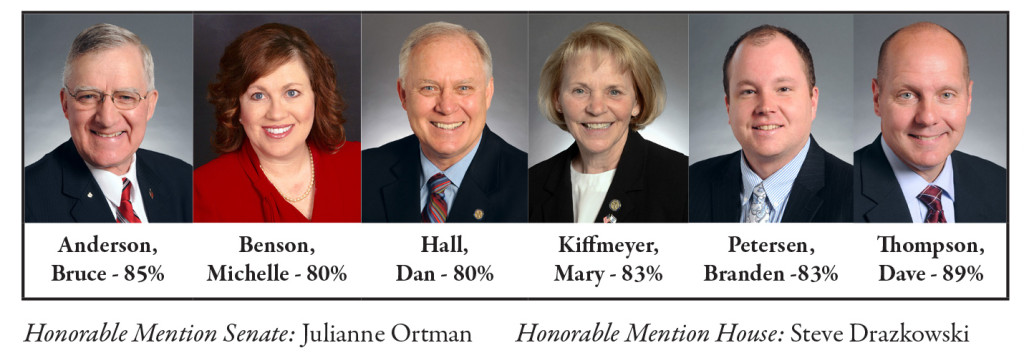2015 Report on Minnesota Legislature Released
Six members of the Minnesota State Senate have been honored in the Legislative Evaluation Assembly’s 2015 Report on the Minnesota Legislature. Two legislators received an honorable mention.
Honorees: Senators Bruce Anderson, Michelle Benson, Dan Hall, Mary Kiffmeyer, Branden Petersen, and Dave Thompson. Honorable Mention: Senator Ortman; Representative Drazkowski.

The Relationship between Quality and Quantity
Press Release by LEA President John Augustine
Do More Bills Getting Votes Lead to Better Legislation?
“Paradoxically, the answer appears to be yes,” notes LEA President John Augustine. “One of the most commonly-used sayings in our culture is ‘quality, not quantity’. However, this trend of pushing more new law into fewer bills is not producing better results.” The increased reliance on omnibus bills hurts accountability, as it provides legislators with more cover to vote for bad policies in bills that also contain some things that have value. It also gives more power to a small group of leaders, because these bills almost always end up in conference-committee negotiations and get to the floor late in session. Members lose opportunities to push for amendments to make the legislation better in the event it reaches the governor’s desk, or to override a governor’s vetoes made after the end of session. Crafting bills with so much packed into them also increases the chances of stalemate and special sessions to settle budgetary disputes. The accountability problems created by these huge omnibus bills are magnified even further in special session, when the legislature simply convenes to ratify the products of closed-door negotiations, without much media scrutiny or citizen input through committee hearings.
The over-reliance on special session can also unfairly penalize some districts and their legislators, who commit to the job during the scheduled legislative session but may not be able to drop all other plans to participate in a special session, especially one convened as this year’s was, with mere hours of notice. Because over half the state budget was decided during special session, LEA decided it was necessary to include some of those votes in the evaluation. Recognizing problems related to special session and the reality of fewer stand-alone bills available for evaluation, LEA made a slight concession in the percent threshold for honoree status, but still was left with fewer legislators meeting our standards.
Though there were fewer legislators with scores above 75 percent this year, the legislature’s aggregate score was up just slightly, to 34.83 percent. We did find more incremental bills receiving widespread legislative support that we could score favorably, such as the “right to try’’ legislation and the legislation to exclude school-age nonprofit child-care programs from licensing requirements. Bipartisan support for gun-rights legislation and concerns about license-plate reader data retention also contributed to fewer legislators scoring below 20 percent, which helped offset the drop in legislators scoring highly.
Last year our honorees all came from the House, but this year they were all from the Senate. A partial explanation for the shift is that there was a larger group of minority-caucus Senators willing to stand on principle against some of the omnibus “garbage” bills, whereas the change in leadership led to more pressure for the new House majority to stick together and help pass the bills they had a say in negotiating.
Same Song, Different Lyrics:
Last year, we advised conservatives hoping to ascend to majority status to resist the temptation to rely on multisubject, omnibus “garbage” bills (especially those that mixed finance with new policies) or to ignore procedural safeguards just to achieve desirable legislative objectives. Though the agenda may have changed, our analysis of the 2015 legislature found that the leaders are still following the same flawed procedural playbook, as evidenced by how much legislation is being packed into the few bills that are getting floor votes. We also noted last year that too many bad bills were moving through the process without receiving opposition in testimony or in committee votes, much less actual floor debate. There is still much room for improvement in that regard as well.
Evaluatory Criteria:
Twenty floor votes were evaluated this year; ranging from omnibus legacy and E-12 education bills, to child care licensure exclusions, to a bill governing data obtained from automated license-plate readers, to gun-rights legislation, to amendments related to abortion facility inspections and felon voting-rights restoration.

Comments
2015 Report on Minnesota Legislature Released — No Comments
HTML tags allowed in your comment: <a href="" title=""> <abbr title=""> <acronym title=""> <b> <blockquote cite=""> <cite> <code> <del datetime=""> <em> <i> <q cite=""> <s> <strike> <strong>